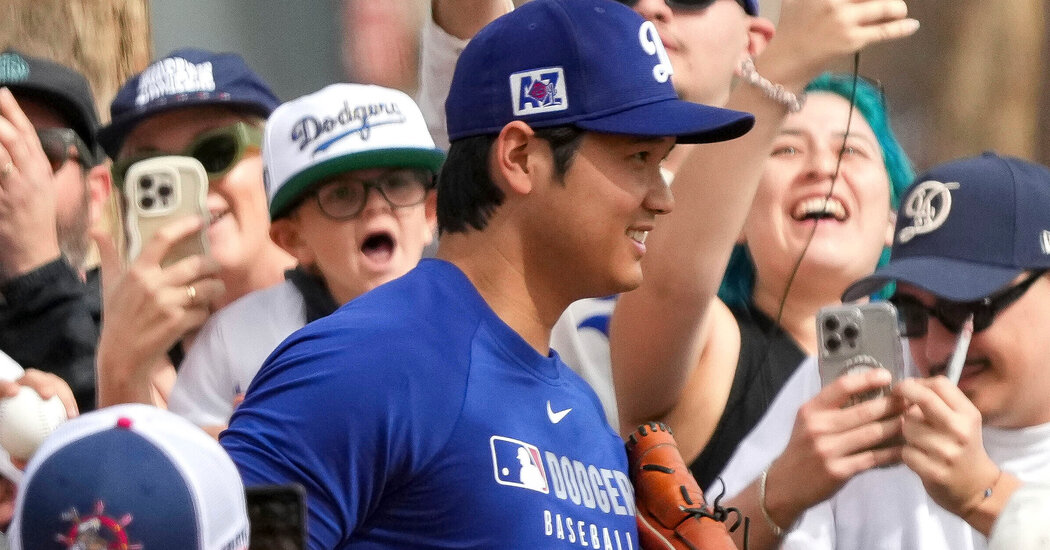
A new baseball season is underway, and the sport is enjoying a sort of renaissance.
Baseball is making more money than it ever has. The addition of a pitch clock has made games quicker and created more action on the field. Attendance and ratings are on the rise.
But the sport also faces a possible long-term problem: the widening gap between its haves and have-nots.
Baseball’s future, both good and bad, is on display in California.
It’s a glorious moment for the Los Angeles Dodgers, who won the World Series last year and have baseball’s biggest star, Shohei Ohtani. After winning the title, the Dodgers added even more talent to their roster — the team will spend well over $300 million this year on player salaries.
A few hundred miles up Interstate 5, in Sacramento, that kind of money feels almost unfathomable. There the Athletics, who left Oakland after 57 years, are playing their home games at a minor-league ballpark as they prepare to move to Las Vegas in three years. The A’s entire payroll is only slightly more than what Ohtani alone is owed each year.
Money doesn’t win games. It’s baseball, after all. And the A’s are scrappy. Even if they aren’t as well compensated, they can beat anyone on any given day. But the imbalance of resources, over time, tends to offer richer teams an advantage.
For today’s newsletter, The Times spoke with the commissioner of Major League Baseball, Rob Manfred, about the state of the game.
Payroll disparity
Unlike other major American sports, baseball does not have a salary cap, which is used to narrow the gap between the richest and poorest teams. Some M.L.B. owners are pushing the league to adopt a salary cap as part of their next contract with the players’ union.
Manfred told us in an interview at his office in New York that he believes the financial imbalance is an existential problem for the sport. “We sell entertainment that’s based on competition,” he said. “If people don’t believe there’s competition, you’ve got a product problem.”
The problem: Players vehemently oppose a salary cap and many insist that they would never agree to play under one. Their union argues that players deserve to be compensated, without restriction, for the work they do.
Last time the owners made a real push for a cap, in 1994, it resulted in a 232-day strike, a canceled World Series and years of fan frustration. The current contract is set to expire after next season. If the owners make another push for a cap, another painful work stoppage could follow.
Baseball’s future
In his interview with The Times, Manfred also spoke about a range of other topics concerning the present and future of the sport, including:
-
Torpedo bats: The new, oddly shaped bats that caused a frenzy when the Yankees used them to hit several home runs are legal and “absolutely good for baseball,” Manfred said.
-
Robot umpires: “The experiment was really successful,” Manfred said about the computerized challenge system for balls and strikes that the league tested during spring training. He hopes to use it in the regular season as soon as next year.
-
Pitching injuries: Manfred warned that pitching “is getting taught in a way that emphasizes velocity and spin rate,” which puts additional strain on pitchers’ elbows. “By the time we get guys,” he said, “they’re already damaged goods.”
-
What would make the game better: Recent rule changes have led to more action on the field, which Manfred thinks is key to the sport’s future. “Action, movement, the ability to show how athletic you are,” he said. “Any changes that allow the showcasing of the athleticism of your players is huge.”
Read the full interview with Manfred here.
For more: At the Athletic, Keith Law offers his predictions for the season and Tim Britton explains how each team could reach the playoffs.
THE LATEST NEWS
Government Overhaul
-
More than 100 chemical weapons sites are thought to remain in Syria after the fall of Bashar al-Assad, inspectors said.
-
Israel said its initial account of the killing of 15 rescue workers had been partially “mistaken.” A video obtained by The Times had contradicted the military’s assertion that the workers had been advancing suspiciously.
-
Rodrigo Duterte, the former Philippine president, is attempting a political comeback from a cell at The Hague. He’s charged with crimes against humanity.
Other Big Stories
THE SUNDAY DEBATE
Do tariffs on cars and car parts help autoworkers?
No. Automakers will lose profits to tariffs, which will likely hurt workers through layoffs and production cuts. “All are possible save the impossible: namely, that the impact of Trump’s tariffs will be zero on an industry he says he supports,” The Detroit News’s Daniel Howes writes.
Yes. Trump’s auto tariffs will bring skilled, high-paid labor needed to produce car parts back to the U.S. “This isn’t protectionism. It’s restoration,” Peter Navarro, Trump’s trade adviser, writes for USA Today.
FROM OPINION
Trump’s attacks on democratic principles are not invincible. If institutions like law firms and universities want to survive, they have to fight back, the Editorial Board writes.
Most clicked yesterday: A couple wanted to a bigger space in a smaller building in Brooklyn. Which home did they choose?
Vows: An awe-inspiring celebration in Guatemala, ruins and volcano included.
Lives Lived: Dave Pelz left his job as a NASA scientist to study the short game of golf, and he made himself a celebrated guru of putts and wedge shots. He died at 85.
BOOK OF THE WEEK
“Heartwood,” by Amity Gaige: For armchair adventurers, Gaige’s twisty mystery will be as gratifying as the first daffodil at the end of a long winter. The tale unfolds in two spheres: In one, we have Valerie Gillis, a 42-year-old nurse who goes missing in Maine while hiking the Appalachian Trail. Her story takes shape through journal entries written as letters to her mother. (Gaige used a version of the same device in her last novel, “Sea Wife,” to great effect. Who doesn’t love reading over a character’s shoulder?) And then we have the crew searching for her, including a game warden, a septuagenarian scientist, fellow hikers and Valerie’s husband, who is, as the kids might say, “sus.” Paths twist, outlooks bleaken and metaphors abound as Gaige guides readers ever closer to answers — which lead to questions worth pondering, even if you don’t own hiking boots.
More on books
THE INTERVIEW
This week’s subject for The Interview is Bill Murray, whose new movie, “The Friend,” is in theaters. He talked about the film, his lifelong quest to be in the moment, and what celebrity has cost him.
The inability to walk down the street anonymously, how did you figure out how to manage that?
It’s a continuous process. It is not like, Oh, I figured that one out, because I’m not the same person now that I was 20 minutes ago. You can have a different point of view about it. You can hide from people. I’ve walked down the street with a hat down over my head, glasses on my eyes. I loved Covid.
Because you could disappear?
Because I could walk down the street with a mask on. But I’ve been all kinds of ways about it, and it’s a continuing development. I used to spend so much energy. People would say, “Can I take your picture?” And I would be the kind of ass that would say, “It’s may I take your picture?” I wasted a whole lot of time that way, doing stuff to make it acceptable on my stupid terms. So now what I do for a living is, I take cellphone photographs. I’m not an actor. I am a donkey that is photographed with people who don’t know how to operate their own cellphone camera.
Have you found a way to get fulfillment out of this new job that you have?
It’s not so much fulfilling. I’ve gotten pretty good at it. Most people recognize when they see how skillful I am with this reverse, they say: “Oh, my God. How did you do that?” Well, because I’ve done it thousands of times, that’s how I got good at it.
Read more of the interview here.
THE NEW YORK TIMES MAGAZINE
In this week’s Five Weeknight Dishes newsletter, Emily Weinstein suggests making “outrageously good” garlicky Alfredo beans, salmon with anchovy-garlic butter, and sheet-pan sausages, sweet potatoes and balsamic kale.
NOW TIME TO PLAY
Source link















